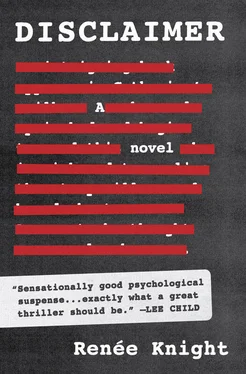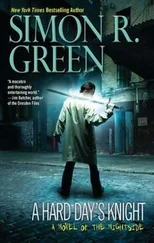What chewed at my heart was that I knew who had taken these pictures. The pain came when I realised who was behind the camera. I knew that handsome face but I couldn’t find him. I looked and looked, but however many times I went through them, all I could see was his shadow, caught on the edge of the frame in one shot. I even went through the negatives, holding them up to the light in case there was one of him which hadn’t been developed. There were more negatives than prints and I hoped one of these might reveal him, but they were blurred, out of focus, useless.
How could Nancy have brought those photographs into our house? And then hidden them from me, allowing them to sit and fester in our home. They must have been there for years. Did she forget about them? Or did she take a risk, knowing that I might come across them one day? But it was too late. By the time I did she was dead. I would never be able to talk to her about them. She should have destroyed them. If she wasn’t going to tell me, then she should have destroyed them. She had left me to find them when I was a pathetic old man, long after the event, long after a time when I could have done anything about it.
One of the things I had most prized about Nancy was her honesty. How many times did she look through those pictures in private? And then hide them again? I imagined her waiting for me to go out and then looking through them and then hiding them when I came home. Every time I took something out of the dresser, every time we played Scrabble, she knew they were there and didn’t say a word. I had always trusted her, but now I worried about what else she might have hidden.
It is extraordinary how much strength anger gives one. I turned the house upside down searching for more secrets. I attacked our home as if it was the enemy. I went from room to room, ripping, spilling, tipping, making a god-awful mess, but I found nothing else. The whole experience left me with the sensation that I had reached down into a blocked drain and was groping around in the sewage trying to clear it. But there was nothing solid to get hold of. All I felt was soft filth, and it got into my skin and under my fingernails, and its stink invaded my nostrils, clinging to the hairs, soaking up into the tiny blood vessels and polluting my entire system.
A speck of dust lands on the pillow. No one else would hear it, but Catherine does. She hears everything — her ears are wide open. She sees everything too. Even in the pitch-black. Her eyes have become accustomed to it. If Robert woke now he would be blind, but Catherine isn’t. She watches his closed eyes, the twitching lids, the flickering lashes, and she wonders what is going on behind them. Is he hiding anything from her? Is he as good at it as she is? He is closer to her than anyone else and yet she has managed, over all these years, to keep him in the dark. It doesn’t matter how intimate they are, he just can’t see it and she finds that thought frightening. And by keeping everything locked up for so long, she has made the secret too big to let out; like a baby that has grown too large to be delivered naturally, it will have to be cut out. The act of keeping the secret a secret has almost become bigger than the secret itself.
Robert rolls onto his back and starts to snore, so Catherine gently propels him onto his other side so his back is to her. She doesn’t want to wake him — she cannot risk a conversation this deep in the night — but she moves close enough so she can smell him.
She remembers the moment, twenty years ago, when he put his arm around her and said: “Are you okay?” She was not okay, but she hadn’t wanted him to notice because she couldn’t tell him why and she wasn’t as good then, as she is now, at covering up. She had said, “No, not really,” and had felt tears behind her eyes but she stopped them from falling because she knew if they fell they would be followed by a torrent of words. If she had cried she wouldn’t have been able to stop everything else coming out. So she didn’t cry, she made a confession, but it was a false one.
“I want to go back to work. I feel bad even saying it. I know I’m lucky having a choice to stay home, you’re earning enough for both of us, but… I’m lonely. I’m depressed…” It was the beginning of her digging a tunnel of escape from herself, but from Nicholas too. Her son was a constant reminder, but she couldn’t tell Robert that. She couldn’t say that being on her own with Nicholas was sending her mad, that his presence threw up memories she wanted to wipe out.
“Do you understand?” she asked. And she remembers looking up into Robert’s eyes and wondering whether he could see through into hers.
“Of course I do,” he said and then pulled her close and kissed her. But she felt his disappointment. He tried to hide it with his kiss; he tried to cover up his regret that she had confessed herself unable to be the kind of mother he wanted for their son. He never said this, he never voiced his disappointment, but she knew it was there, unspoken, between them.
There was a moment when she nearly told him the truth. But instead she lied again and said that she was going to stay with an old school friend for the weekend. It was a friend he didn’t know well, a friend who lived outside London; he would never find out. She told him it was an emergency — that the friend was having a breakdown. She packed a bag and left straight from work on Friday, leaving the new nanny to pick up Nicholas from school and getting away before Robert got home from work. She took a taxi, not the tube — she didn’t want to risk bumping into anyone she knew.
When she came home on Sunday evening, Nicholas was already in bed. Robert told her she looked pale and she said it had been a pretty ghastly weekend and that she was exhausted. That was all true.
“I need an early night, that’s all,” she said and then changed the subject, asking him about the new nanny.
“Seemed to go well. Nick was a chirpy little thing when I got home on Friday.”
“That’s good,” she said.
And then in the morning she made sure she was fine. There was a little colour back in her cheeks, and she had to get Nick ready for school before going to work, so there was no time to talk, for him to notice if she was distracted. Work too was hectic. She was up to her eyes and that’s what she wanted. To be so busy that there was no room left in her head for remembering. And she succeeded in emptying her mind of the past. That was the point. That’s what drove her. But now the past has elbowed its way back in, shoving everything else aside — standing there, chest puffed out, demanding her attention.
The book still lies on the table next to the bed. She can’t finish reading it. She has tried, but each time she retreats like a coward, going back again and again, rereading the same words. She is trapped in its middle. She peels away from Robert and slides out of bed, picking up the book as she goes, then creeping downstairs like a burglar.
She thumps the book down on the kitchen table and turns her back on it, a feeble act of rebellion. Today is Sunday, a day of rest, but not for her. She makes tea, takes it up to the spare room and sits on the floor. There are five boxes here waiting to be unpacked: two have Nicholas’s name on them; three are marked SPARE ROOM. She can’t remember what’s in them. She feels light-headed from lack of sleep and her hands are shaking as she pulls things out, tearing and ripping at newspaper, unwrapping knickknack after knickknack, all pointless, useless things. She’d hoped for a clue — a note, an envelope, anything which might be connected to the book and help her trace its route into her home, but there is nothing. She tries another box. Book after book after book, which she dumps on the empty shelves, not bothering to stand them up, allowing them to slip and slide against each other, leaving some to tumble to the floor with a thump.
Читать дальше












